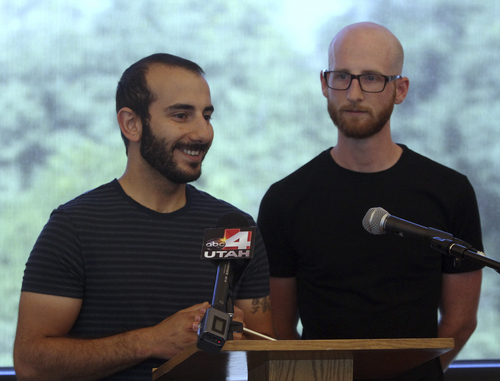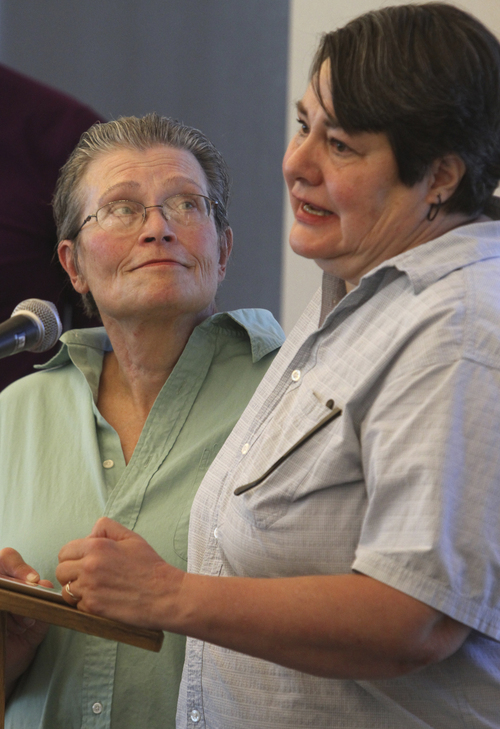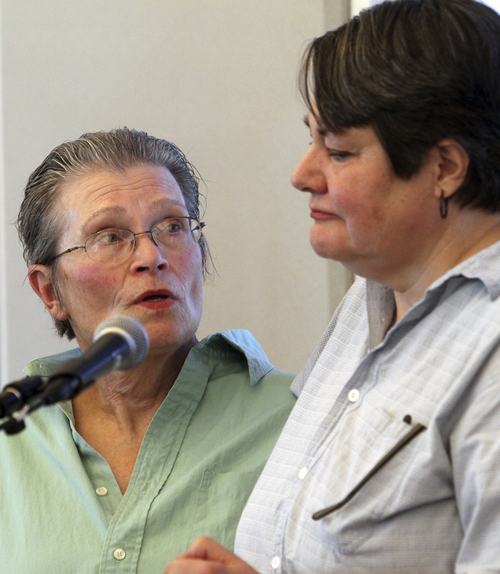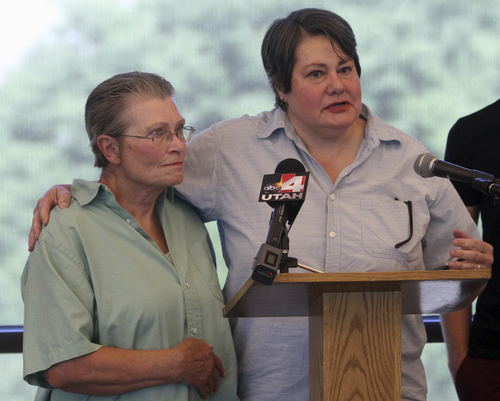This is an archived article that was published on sltrib.com in 2013, and information in the article may be outdated. It is provided only for personal research purposes and may not be reprinted.
Attorneys for three same-sex couples and for the state of Utah laid out their best arguments in motions filed Friday as each side asked a federal judge to find in their favor in a battle over marriage rights.
On one side, the state argues it has the right to set as policy an "age-old and still predominant" definition of marriage as a union of a man and a woman. On the other, the three couples say the choice of a marriage partner is a "fundamental right and liberty interest" protected by the U.S. Constitution.
A hearing on the summary judgment motions is set for Dec. 4 before U.S. District Judge Robert J. Shelby. If Shelby declines to grant summary judgment to either side, the case will remain on track for a trial.
The three same-sex couples filed the federal lawsuit in March, alleging the voter-approved amendment that took effect in 2005 discriminates against and denies gay and lesbian citizens rights based on whom they choose to love. The plaintiffs are Derek Kitchen and Moudi Sbeity; Karen Archer and Kate Call; and Laurie Wood and Kody Partridge.
The state's motion for summary judgment was supplemented by 29 appendices referencing, among other documents, the Utah Constitution, Amendment 3 and articles from such entities at the Institute for American Values, the Witherspoon Institute, Commission on Parenthood's Future and scholars ranging from Claude Levi-Strauss to David Popenoe.
The state argues the case is "really about who decides, not who is right in this important policy debate." And the Constitution, it adds, "does not withhold from Utah the right to choose how to define marriage," as the U.S. Supreme Court reaffirmed in its decision in the Defense of Marriage Act (DOMA) same-sex marriage case.
Utah has made that decision: marriage is between a man and a woman, the state argues, and its traditional definition of marriage rationally promotes the state's interest in "responsible procreation" and the "optimal mode of child-reading," among other things. The motion notes Utah is the most-married and most "child-centric" state in the nation.
"Same-sex couples, who cannot procreate, do not promote the state's interests in responsible procreation (regardless of whether they harm it)," the state argues. The state uses that same argument to defend its right to not recognize same-sex marriages performed elsewhere.
The state also argues Amendment 3 does not discriminate because "neither a man nor a woman may marry a person of the same sex."
The outcome of the case, the state said, will impact states' preferences for children to be raised by married couples when possible; state sovereignty; and other constitutional issues.
"Plaintiffs are free to advocate for their own version of marriage through the political process," the state said in its motion. "But they are not entitled to have their views imposed by judicial fiat."
The three couples reference cases that have defined the freedom to marry as one of the "vital personal rights essential to the orderly pursuit of happiness," a basic right that is "fundamental to our very existence and survival."
"The right to choose one's marriage partner is the very essence of the kind of decision our culture recognizes as personal and important," the plaintiffs said.
To restrict that right, the state must show its "marriage discrimination laws" are narrowly tailored to meet a compelling government interest, the plaintiffs said. Utah's Amendment 3 fails that test because it furthers a moral view that same-sex couples are immoral and inferior to opposite-sex couples, they argue. The plaintiffs also cite the U.S. Supreme Court ruling in DOMA, noting the federal law was struck down because it infringed on the liberty rights of individuals to form intimate relationships.
"The state has not identified a single harm that it, or anyone else, would suffer as a result of allowing plaintiffs to exercise their constitutionally protected autonomy to choose a marriage partner of the same sex," the plaintiffs said in their motion.
The couples, who all were denied a marriage license by the Salt Lake County Clerk's Office, filed affidavits Friday describing how they feel the state's ban has caused them humiliation, emotional distress, pain, psychological harm and stigma — the same ills that led the high court to strike down DOMA, they argue.
The lack of public recognition of their relationships creates everyday challenges that range from not being able to share gym memberships to confusion about how to fill out car rental and hotel forms and secure assets.
"Not being able to marry and dignify our relationship with that time-honored recognition has resulted in people referring to our relationship in juvenile terms like 'boyfriend,' 'friend,' or something similar that makes me feel like my serious relationship is being belittled," said Kitchen, 25, who has been in a committed relationship with Sbeity for four years.
In addition to not having their relationships publicly sanctioned as marriages, the couples said other harms included not being able to jointly file federal and state tax returns in Utah; have their joint holdings recognized as marital property; be able to make life and property decisions in the event a partner became ill or died; and create mutual obligations in the event they were to separate in the future.
Partridge, 47, said she and partner Laurie Wood have taken legal and financial steps to recognize and protect their assets and relationship. But "the language of Amendment 3 puts into doubt whether those rights and benefits, including medical provisions, will be recognized by the state of Utah," she said in her affidavit.
"We are productive and respected members of this community, and there is no reason that the state should deny us the right to legally marry just because we are both women," Partridge said. end opt trim
Karen Archer and Kate Call married legally in Iowa in 2011. Archer, 67, is a retired OB/GYN and suffers physical ailments. Like the other couples, the two have written wills and medical directives but "there is no guarantee that our legal documents will hold up as my illnesses progress, Archer said.
"I wish that Kate and I could have the security that other married couples in Utah have as we face these challenges," she said.
Twitter: Brooke4Trib









